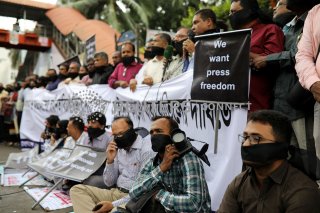Digital Authoritarianism in Bangladesh: What You Need To Know
The rise of digital authoritarianism has become a troubling trend. For countries like Bangladesh, where civil and political rights of citizens have never been consolidated, authoritarian behavior online by governments is even more troubling.
In May 2020, two months after the first cases of coronavirus in Bangladesh, the government issued an order warning officials not to make negative comments on social media about “[the] state or its important persons,” declaring that any violator would face personal repercussions and legal actions. The instructions explicitly commanded public servants “not to upload, share, comment on or react to social media posts, including image, audio or video, with ‘damaging’ messages.” The number of legal cases under the Digital Security Act against journalists and ordinary citizens has significantly increased as people suffer the consequences of an ill-planned and ill-implemented response to coronavirus in Bangladesh, and of the rampant corruption in the health sector.
As such, controlling the flow of information by curbing freedom of expression online and offline while criminalizing even mildly opposing views undoubtedly constitutes a brutally effective political strategy for the ruling party in Bangladesh.
Digital Bangladesh
The rise of digital authoritarianism across the globe, led by China and Russia, has become a troubling trend, from Turkey to Sudan to India to Zimbabwe to Brazil. However, for countries like Bangladesh, where civil and political rights of citizens have never been consolidated, authoritarian behavior online by governments is even more troubling. In the absence of democratic models of digital governance, Chinese and Russian’s leadership in exporting digital authoritarianism may lead us to unfamiliar and damaging territory within the realm of digital governance, and particularly in already authoritarian countries like Bangladesh. Competitive democratic models of digital governance that counter China and Russia as role models of digital authoritarianism need to be championed by the United States and other established democracies. Such a task should also engage in public diplomacy—creating awareness about digital civil and political rights, empowering citizens to challenge digital authoritarian behavior, and promoting digital critical thinking skills.
The government of Bangladesh headed by Prime Minister Sheikh Hasina has extensively campaigned for, and promised its citizens, a “Digital Bangladesh” ever since it came to power in 2008. In 2019, Hasina claimed that her government has made the dream of a Digital Bangladesh a reality. And yet, the presence of a powerful Digital Security Act that aims to control what can be said online, and the punishment of citizens for any remotely unfavorable online content, make the prime minister’s proclamations about a “Digital Bangladesh” ring hollow.
Fahmida Zaman is a doctoral student with the University of Delaware’s Department of Political Science & International Relations. She was a research intern at the Woodrow Wilson Center in Washington, DC this past summer.

